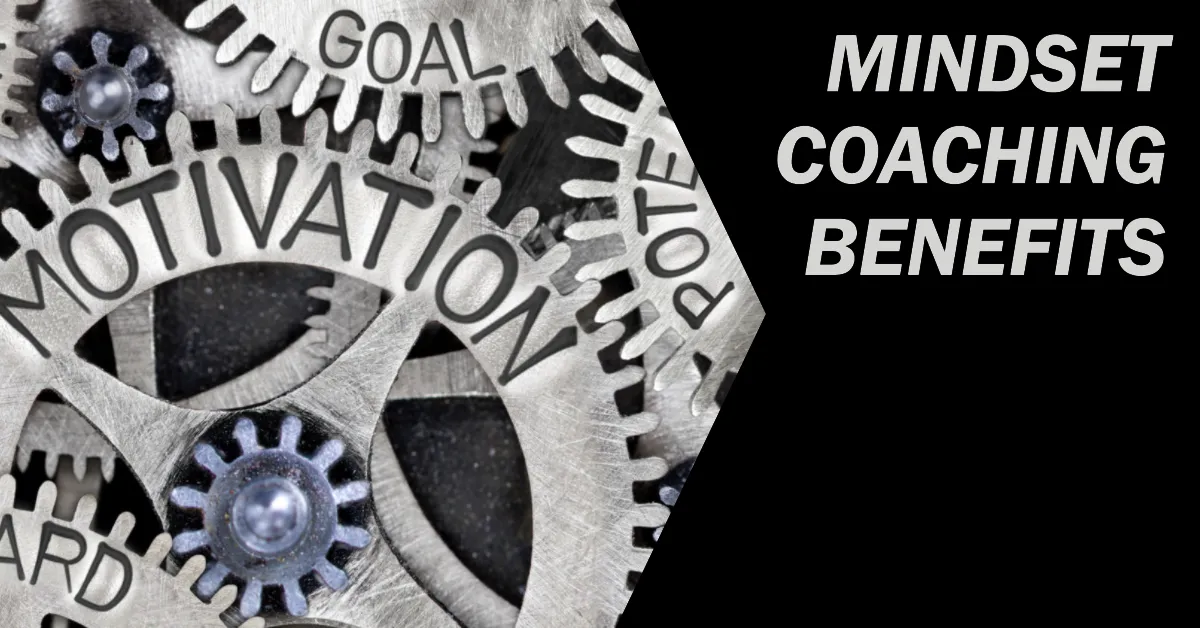Are you looking to improve your mindset and achieve your goals? Mindset coaching may be the answer. But is it a form of training? Many people debate over whether or not mindset coaching falls under the category of training, but the truth lies somewhere in between.
Mindset coaching involves working with a coach to shift your thinking patterns and beliefs in order to achieve personal growth and success. It focuses on developing a positive, growth-oriented mindset that can help individuals overcome obstacles and reach their full potential. While traditional training programs focus on teaching specific skills or knowledge, mindset coaching aims to change the way individuals approach challenges and opportunities in all areas of life. So, is it a form of training? Let’s explore this question further.
Table of Contents
Key Takeaways
- Mindset coaching helps individuals develop a positive and growth-oriented mindset by identifying limiting beliefs, negative thought patterns, and self-sabotaging behaviors.
- Mindset coaching goes deeper by addressing the underlying beliefs and attitudes that influence behavior, helping individuals break free from limiting beliefs and create a more positive outlook on life.
- Coaching plays a crucial role in developing our mindsets, encompassing our beliefs, attitudes, and values, and helping us identify and address any limiting beliefs or negative self-talk that may be holding us back.
- Mindset coaching can be considered a valuable form of training for personal and professional growth, focusing on developing an overall outlook or mindset that supports growth and success in all areas of life.
Definition of Mindset Coaching
Mindset coaching is all about helping individuals develop a positive and growth-oriented mindset that allows them to overcome challenges and achieve their goals. It involves working with clients to identify limiting beliefs, negative thought patterns, and self-sabotaging behaviors that may be holding them back from reaching their full potential.
A mindset coach helps clients shift their perspectives, adopt new ways of thinking, and develop habits that support their desired outcomes. This type of coaching is not focused on teaching specific skills or techniques but rather on helping individuals cultivate an empowering mindset that can be applied across multiple areas of life.
In essence, mindset coaching is a form of training because it guides individuals through a process of learning and growth. However, unlike traditional forms of training that focus solely on acquiring knowledge or technical skills, mindset coaching goes deeper by addressing the underlying beliefs and attitudes that influence behavior.
By working with a skilled mindset coach, you can learn how to break free from limiting beliefs and create a more positive outlook on life. You can gain the confidence and resilience needed to overcome obstacles and pursue your dreams with greater ease. Ultimately, mindset coaching can help you become the best version of yourself possible.
The Benefits of Mindset Coaching

When it comes to mindset coaching, you can expect to reap numerous benefits that will help you become more resilient, develop a growth mindset, and increase your self-awareness. Through this type of coaching, you’ll learn how to bounce back from challenges and setbacks, view failures as opportunities for growth, and embrace new experiences with confidence. You’ll also gain a deeper understanding of your thoughts and emotions, enabling you to make better decisions and thrive in both personal and professional settings.
Development of Resilience
Building resilience takes time and effort, but it’s worth it in the end to overcome life’s challenges. Mindset coaching can help you develop this crucial trait by teaching you how to overcome obstacles and setbacks. With a resilient mindset, you’ll be better equipped to handle stress, bounce back from failure, and stay focused on your goals.
To develop resilience through mindset coaching, you need to focus on several key areas:
- Self-awareness: Understanding your thoughts and emotions is essential for building resilience. By recognizing negative patterns of thinking or feeling stuck in certain situations, you can take steps to change them.
- Positive self-talk: Learning how to reframe negative thoughts into positive ones is another important aspect of developing resilience. This will help you maintain a more optimistic outlook even when things get tough.
- Goal setting: Setting achievable goals helps build confidence and provides motivation during difficult times. It also helps prioritize what’s important in your life.
By working with a mindset coach, you can learn these skills and more to become more resilient in the face of adversity. With practice and dedication, anyone can develop the mental toughness needed to achieve their dreams and live a fulfilling life.
Growth Mindset
You are capable of embracing challenges and seeing them as opportunities for growth, like a plant that thrives when it faces adversity. This is the essence of having a growth mindset. With this mindset, you believe that your abilities can improve with practice and effort. Instead of fearing failure or seeing it as a sign of inadequacy, you welcome it as a chance to learn and become better.
A growth mindset is not just about being positive or optimistic; it’s also about being realistic and strategic. You recognize that change takes time and hard work, but you’re willing to invest in yourself because you know the rewards are worth it. With a growth mindset, you’re more likely to take on challenges outside your comfort zone, seek feedback from others, learn from your mistakes, and persist in the face of obstacles. By cultivating this mindset through coaching or self-reflection, you can develop resilience and achieve greater success in all areas of life.
Increased Self-awareness
To truly understand your strengths and weaknesses, it’s important to take a step back and reflect on your actions and behaviors. Increased self-awareness is one of the key benefits of mindset coaching. By working with a coach, you can identify patterns in your thinking that may be holding you back or limiting your potential. This increased awareness allows you to make more intentional choices about how you approach challenges in both your personal and professional life.
Here are three ways that increased self-awareness can benefit you:
- Helps you identify areas for improvement: When you become more self-aware, you start to notice areas where you could improve. This can include things like communication skills, time management, or emotional intelligence.
- Allows for better decision making: With greater awareness of your thoughts and feelings, you’re able to make decisions that align with your values and goals. You’ll also be less likely to make impulsive decisions based on emotions alone.
- Improves relationships: Self-awareness enables us to understand how our behavior affects others and adjust accordingly. By developing this skill, we can build stronger relationships with family members, friends, colleagues, or clients by being more empathetic toward them.
The Power of Mindset
In the quest to answer the question “Is mindset a form of training?”, it’s essential to delve into the profound power that our mindset possesses. At the core of our thoughts, feelings, and actions, our mindset molds our perception of ourselves and the world around us. It impacts our attitudes, determines our approach to life, and ultimately directs our behaviors and outcomes.
A mindset is not a static or fixed attribute but a malleable quality that can be trained, much like a muscle. This dynamism is what allows us to influence our mindset and channel its power to foster personal growth and enhance our life experiences.
Psychologist Carol Dweck’s research on growth mindset and fixed mindset illuminates the power of mindset and its trainability. According to Dweck, individuals with a fixed mindset believe their abilities are static and unchangeable. On the contrary, those with a growth mindset believe their skills can be developed through hard work and persistence. The latter fosters a love for learning, resilience in the face of setbacks, and ultimately leads to higher achievement.
In the context of training, cultivating a growth mindset becomes a critical form of mental conditioning. It enables us to adopt a positive perspective toward challenges, view failures as opportunities for growth, and continuously strive for improvement. In essence, training our mindset is about learning to shift from a fixed perspective to a growth-oriented one.
As explained before, training the mind can have extensive benefits, from enhancing cognitive functions to boosting emotional intelligence. By consciously directing our thoughts toward positivity, resilience, and adaptability, we can significantly improve our mental health, personal relationships, career trajectories, and overall quality of life.
In conclusion, the power of mindset is profound and far-reaching. While it’s intangible and might seem elusive, it can indeed be trained. By investing time and effort in cultivating a growth-oriented mindset, we can harness this power and use it as a tool to improve various aspects of our lives.
The Debate: Is Mindset Coaching a Form of Training?
Although some may argue otherwise, mindset coaching can be considered a valuable form of training for personal and professional growth. While traditional forms of training focus on technical skills and knowledge, mindset coaching focuses on developing the individual’s thinking patterns, beliefs, and attitudes to achieve success.
Mindset coaching involves identifying self-limiting beliefs that hold individuals back from reaching their full potential. The coach helps individuals develop a growth mindset by teaching them how to reframe negative thoughts into positive ones. By doing so, individuals become more resilient in the face of challenges and setbacks.
While there may be debate about whether mindset coaching is a form of training, its value cannot be denied. By helping individuals develop a growth mindset and increasing self-awareness, it supports personal and professional development in ways that traditional training cannot always achieve.
The Role of Coaching in Mindset Development
So, you’ve been debating whether or not mindset coaching is a form of training. It’s understandable – the two can seem quite different on the surface. But as we delve deeper into the topic, it becomes clear that coaching plays a crucial role in developing our mindsets.
It’s important to note that when we talk about mindset development, we’re not just talking about positive thinking or visualization techniques. Mindset encompasses our beliefs, attitudes, and values – all of which shape our behaviors and outcomes in life. And this is where coaching comes in handy.
Coaching helps us identify and address any limiting beliefs or negative self-talk that may be holding us back. A coach can guide us toward reframing our thoughts and perspectives to be more empowering and supportive of our goals. They can also provide accountability and support as we work toward making lasting changes in our mindset.
In short, while training may focus on improving specific skills or knowledge, coaching focuses on developing an overall outlook or mindset that supports growth and success in all areas of life. So yes, mindset coaching is indeed a form of training – one that can have a significant impact on personal and professional development.




